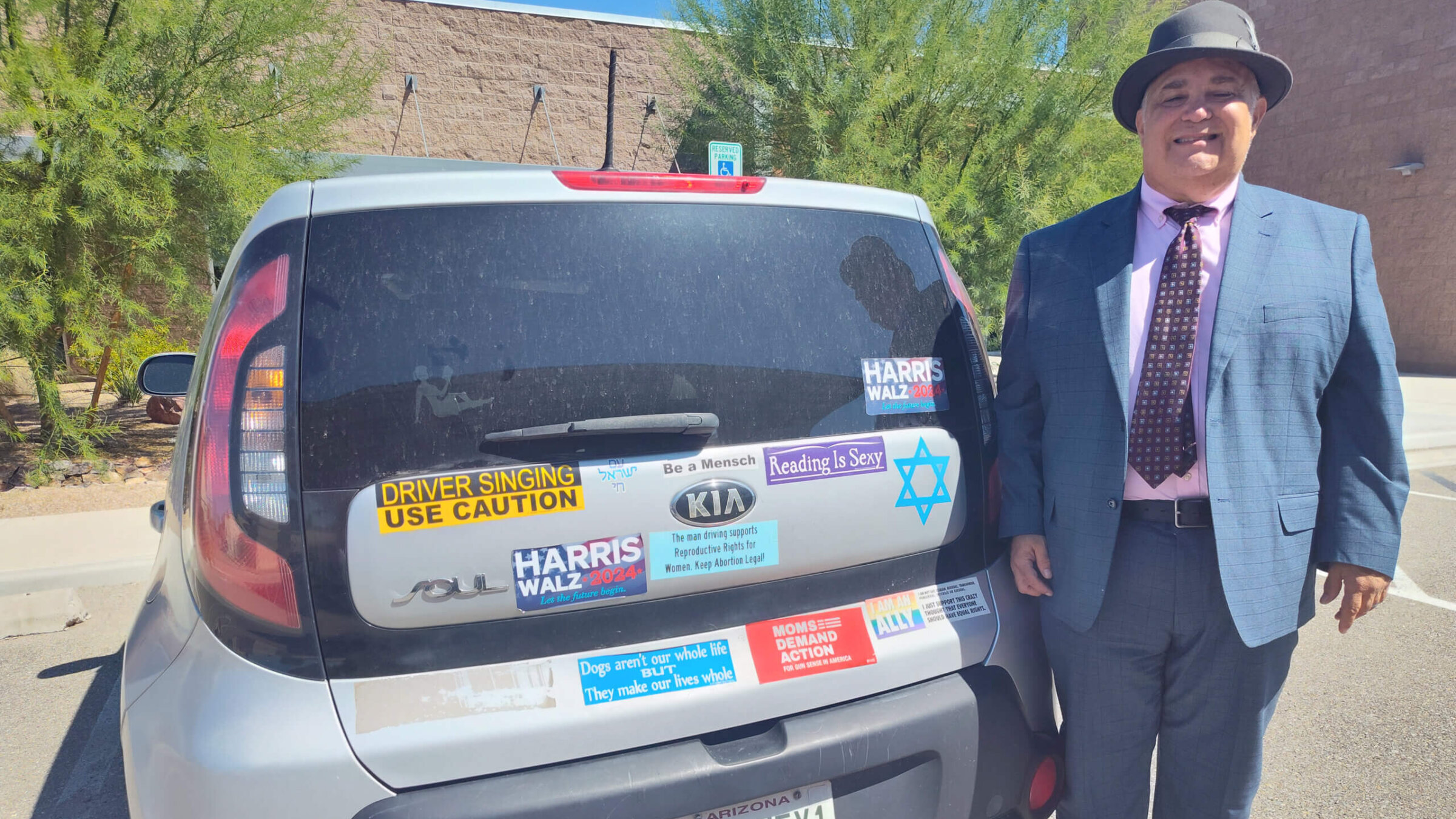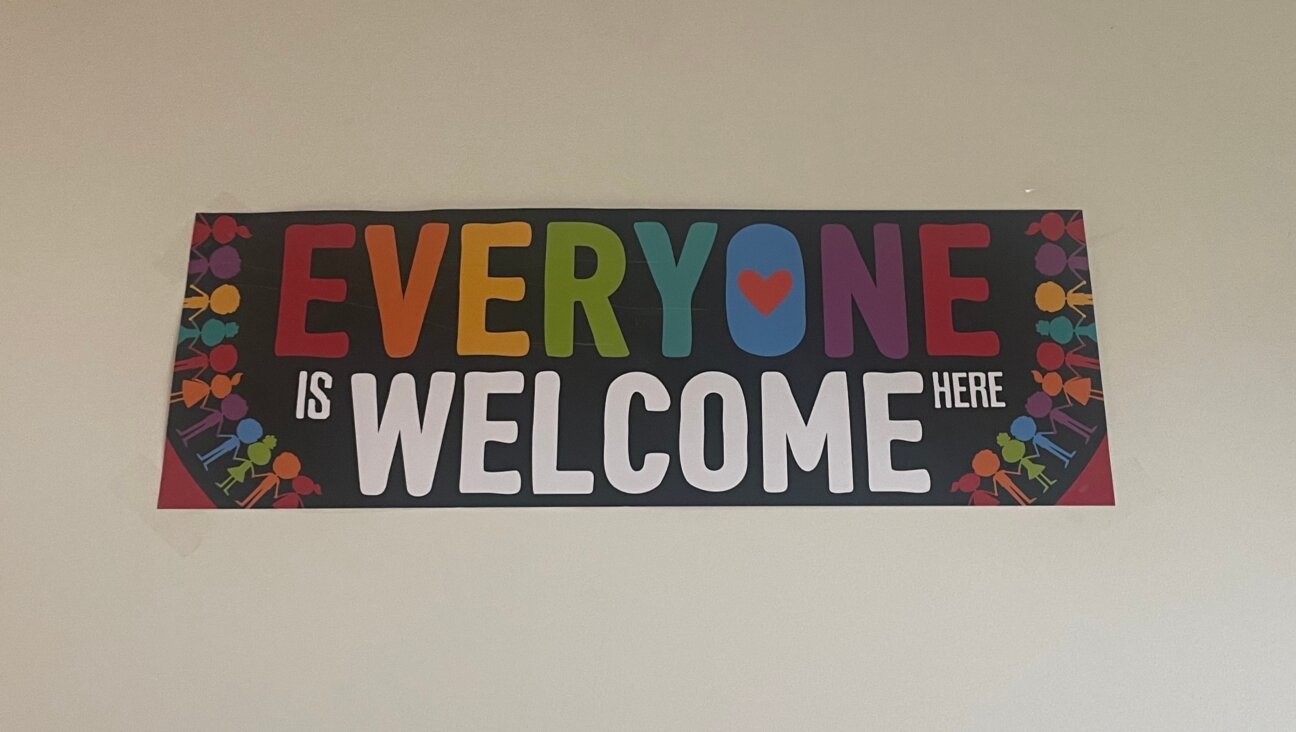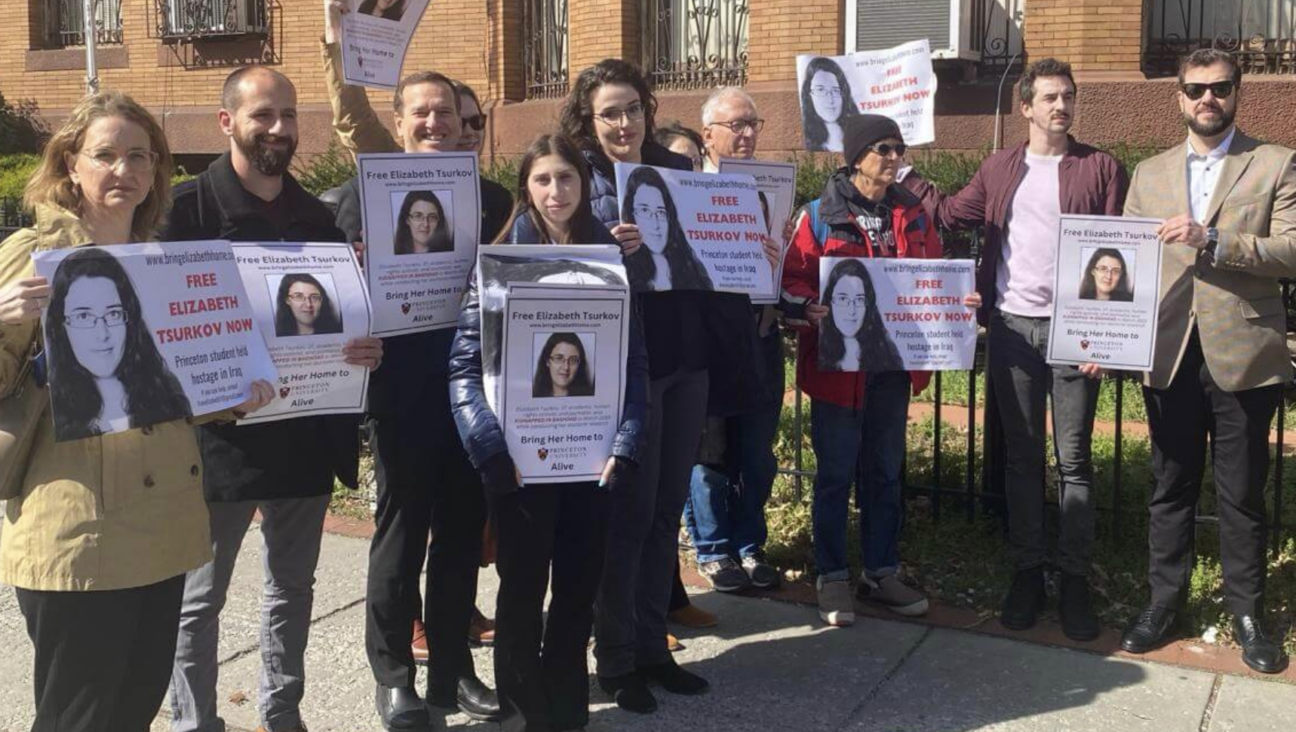Finding the line between antisemitism and anti-Zionism — on a bumper sticker
A 17-year-old shouted “Free Palestine” at an Arizona lawyer with a Star of David on his car, and what happened next.

The bumper of Tony Zinman’s car is a billboard for who he is and what he cares about Courtesy of Tony Zinman
The blurry line between anti-Zionism and antisemitism is particularly hard to see when someone is shouting at you, defacing your car or spitting in your face. Consider the case of Tony Zinman.
Zinman, 57, is a juvenile public defender in Tucson, Arizona, and a Democrat who has been active in political campaigns since he was a teenager. He also sings in his synagogue choir and started a nonprofit called Tucson Jews for Justice to oppose former President Donald Trump’s immigration policies. Since Oct. 7, he’s led rallies for Israeli hostages in Gaza, written pro-Israel articles in local papers and spoken against ceasefire resolutions at city council meetings.
The back of his silver 2016 Kia Soul — license plate OYVEY1 — has long been a billboard for who Zinman is and what he cares about. “Reading is sexy,” is one of its many bumper stickers. “Driver Singing Use Caution,” reads another. A rainbow flag captioned “I’m an ally”; slogans supporting gun control and reproductive rights; a paean professing devotion to dogs.
There was also a blue Star of David. And a sticker that screamed “F*** Hamas.”
We’ll never know for sure which of these primarily provoked a 17-year-old son of Arab-Muslim immigrants to shout “Free Palestine!” at Zinman as he sat in his car one day this spring after lunch in a downtown Tucson hotel. The teenager then scratched some of the Star of David off the car, according to a police report, and when Zinman told him to stop, spit on the sticker and then at Zinman himself.
The young man, whose photo Zinman captured on his phone, was quickly tracked down, with the help of Arizona State Rep. Alma Hernandez — a friend and political partner of Zinman’s — Facebook and the local high school where the suspect had graduated in December 2023. He immediately admitted harassing Zinman and defacing his car, according to the police report, and said he was motivated by politics, not Zinman’s religion.
In fact he said he “was unaware that Israel had any association with the Jewish religion;” described the six-pointed star as “an Israeli sticker;” and “expressed that he was aware that his actions were a mistake.”
The suspect, whose name is redacted in the report because he was a minor, “has Jewish friends and he and his family harbor no ill will towards the Jewish faith,” the police interviewer recounted. He “was simply upset due to the war in Palestine and he views Israel as the aggressor.”
This distinction mattered a lot in the criminal justice system. It meant the 17-year-old was charged with misdemeanor assault and criminal damage, but not a “hate and bias” crime, and thus sent to a diversion program where punishments are typically community service hours rather than a court and, potentially, prison.
To Zinman, though, it’s a distinction without a difference.
“If you’re Jewish — almost all Jews are going to have a strong tie to Zionism,” he told me when we spoke by Zoom this week. “It’s part of Judaism. Every week in synagogue we talk about Israel, so I don’t see a difference.”
I have always seen antisemitism and anti-Zionism as a Venn diagram — each its own thing, but with a decent amount of overlap. That overlap has clearly grown since Oct. 7, if only because there is so much more — and much more visible — anti-Zionism. Huge protests that shut down city streets and public-transit centers last fall, tent encampments that disrupted college campuses this spring, vitriol exploding across social media.
Overlap is one thing. What’s concerning is how Jewish institutions and pro-Israel advocates increasingly conflate the two. The Anti Defamation League, for example, changed its criteria for its tracker of antisemitic incidents to include rallies that feature anti-Zionist chants, and is not always crystal clear in communicating that. There was no mention of the change in a fundraising email this week that said antisemitic harassment “swelled 184%” last year amid a total of 8,873 incidents, or what it described as an average of “one antisemitic act every hour of every day throughout the entire year.”
I have no doubt that antisemitism is real. I also have no doubt that it is being exaggerated in many circles because fomenting fear is an effective political tool. What happened to Zinman is horrible, whether it was motivated mainly by his identity or by his political views. It’s also not a sign, as some would have you believe, that we are living in 1930s Germany.
“I wanted to see the kid charged because I wanted to be able to confront him in court. I asked for an essay — an apology letter, and an essay on why what he did was antisemitism.”
– Tony Zinman
I know you have seen videos of Jewish college students being harassed, perhaps even assaulted. I also know these were relatively isolated incidents viewed and shared and cited gazillions of times.
Perhaps you know, personally, someone like Zinman, who directly experienced antisemitism over the last year, underpinned by anti-Israel sentiment or not. Maybe it’s even happened to you.
I wish, of course, that there was no antisemitism for the ADL to track. But I also wish everyone would remember that there is a critical difference between the ugly attack Zinman suffered, or the rampant stereotyping seen online, and the kind of discrimination our ancestors dealt with.
Ask yourself: Have you or someone you love been prevented from starting a business or living in a certain neighborhood, barred from a country club or restaurant, rejected from a job or for a loan because you are Jewish? I have not.
And while I have some concerns about the kind of environment my children might find at college when they go next fall, I am not at all nervous that they might not get in because they celebrate Hanukkah.
The reality of how little the much-ballyhooed rise in antisemitism actually affects me — and most of us — day to day hit home for me one night in June. . I’d gone into Manhattan for the premiere of Screams Before Silence, the documentary hosted by Sheryl Sandberg about the sexual violence perpetrated by Hamas during the Oct. 7 attack. A scheduling hiccup had made me commute in from an unfamiliar train station, and I wasn’t entirely sure I’d parked in an OK place.
When I returned around 10 p.m. and didn’t immediately see the car, I had a momentary panic: Could the synagogue magnet on my bumper have attracted hateful vandals?
I quickly got reoriented and located the car, which was untouched. As I drove home, I felt lucky realizing that in all these months of war and division, in all these years of supposedly skyrocketing antisemitism across the United States, this was the first and only time I’d given a second thought to the Star of David on the back of my car.
Which brings us back to Tony Zinman.
He’s a barrel of a man, who wears a jaunty fedora, and a Star of David pendant under his pink button-down shirt and tie as well as on a pinky ring. His hobby is community theater — he’s played Big Julie in Guys & Dolls, “Putzie” in Grease, the butler in Annie. His first gig in politics was driving the press van on Walter Mondale’s 1984 campaign in Los Angeles; he was 17.
Politically, he describes himself as a “radical centrist.” He and Hernandez, the Latina Jew elected to the Arizona state legislature in 2018, created the Jews for Justice group together in 2018, and four years later “made a lot of stink,” as Zinman put it, about the antisemitism spewed by four Republican candidates for public office in Arizona.
“I’ve always been kind of an out-and-proud Jew,” Zinman said. He’s never been to Israel.
When I asked about the worst antisemitism he’d experienced before Oct. 7, Zinman mentioned a fraternity prank at the University of Arizona where someone sent him pizza with ham on it.
So, nothing major. Until that day in March when the teenager confronted him in his car.
“I was real shaken up,” Zinman told me. “Scared. Traumatized. Freaked out.”

As a public defender, he was used to being skeptical of crime victims, challenging their credibility in court. Now he was one.
He found himself, instead, skeptical of the youth’s story that he did not know Israel was linked to Judaism and the Star of David was a Jewish symbol separate from the Israeli flag.
“I wanted to see the kid charged because I wanted to be able to confront him in court,” he added. “I asked for an essay — an apology letter, and an essay on why what he did was antisemitism. That was my request.”
Instead, because the police did not file it as a bias crime, the young man was sent to teen court, where he was judged by his peers. Zinman was not allowed to attend the hearing, which was on Saturday. The youth was sentenced to attend a “Keep your cool” workshop and do an independent study project on racial awareness,
Zinman has not stopped advocating for Israel, even after a second incident, in April, where his car was vandalized overnight while parked in his driveway. This time, vandals spray-painted “F*** Israel” on the side and blacked out all the bumper stickers.
A friend of a co-worker helped him clean it up. Zinman’s wife urged him not to re-plaster it with bumper stickers, but Zinman felt that was akin to letting the terrorists win.
“Reading is sexy,” is there again, along with the one about the driver might be singing. There are two “Harris-Walz” stickers. And that blue Star of David is back where it used to be, in the right-hand corner.
No epithets against Hamas this time.
A message from our Publisher & CEO Rachel Fishman Feddersen

I hope you appreciated this article. Before you go, I’d like to ask you to please support the Forward’s award-winning, nonprofit journalism so that we can be prepared for whatever news 2025 brings.
At a time when other newsrooms are closing or cutting back, the Forward has removed its paywall and invested additional resources to report on the ground from Israel and around the U.S. on the impact of the war, rising antisemitism and polarized discourse.
Readers like you make it all possible. Support our work by becoming a Forward Member and connect with our journalism and your community.
— Rachel Fishman Feddersen, Publisher and CEO






























